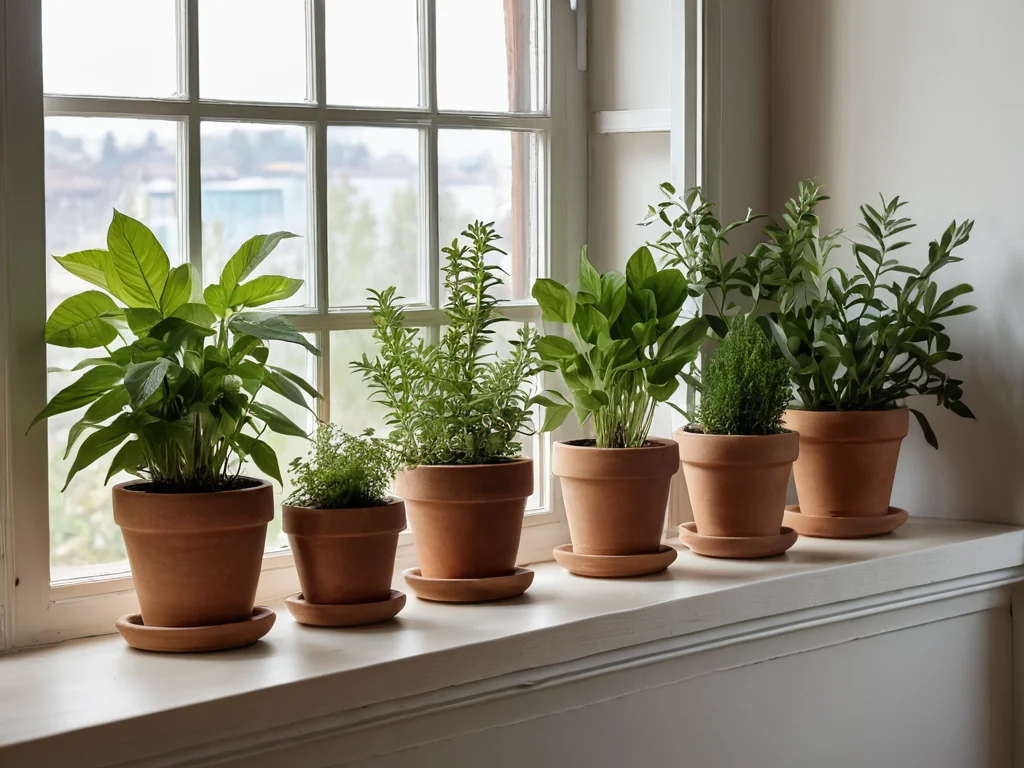In the hustle and bustle of modern life, as each of us seeks ways to improve our quality of life, the ancient art of Feng Shui offers surprisingly simple yet powerful solutions. One such solution is creating a living, healing corner right on your windowsill using medicinal herbs. These unpretentious plants can not only enrich your table with fresh aromas and vitamins but also, according to Feng Shui principles, actively harmonize the space, attracting the energy of health, prosperity, and tranquility into your home.
Introduction. The Healing Power of Herbs and Feng Shui: Harmony on Your Windowsill
The idea that living plants possess a special power has been inherent in many cultures for millennia. In Feng Shui, this belief is perfected, offering clear recommendations for placing and caring for plants to maximize their positive impact on the surrounding space and human well-being. Medicinal herbs grown on the windowsill are a prime example of such a symbiosis of practical benefit and deep energetic work. They are not just decorative elements but living tools for improving the quality of Qi (life energy) in your home.
Many of us strive to create a cozy and favorable space, but often don’t realize that one of the most effective and accessible ways is precisely working with plants. Imagine: a small green oasis that not only pleases the eye with its freshness but also actively works to attract luck, strengthen health, and create an atmosphere of peace. This is not fantasy, but a perfectly achievable reality, which we will examine in detail in this article, drawing on the wisdom of Feng Shui and years of experience with plants.
Our goal is to show you how, using simple Feng Shui principles, you can transform an ordinary windowsill into a powerful source of positive energy. We will explore which herbs are most favorable, how to place them correctly, how to care for them to maintain their vitality, and what mistakes to avoid to prevent blocking the flow of beneficial Qi. You will see that creating a harmonious space filled with freshness and healing power is much easier than it seems.
The Energy of Qi and Living Plants: Why Herbs on the Windowsill Are More Than Just Decor
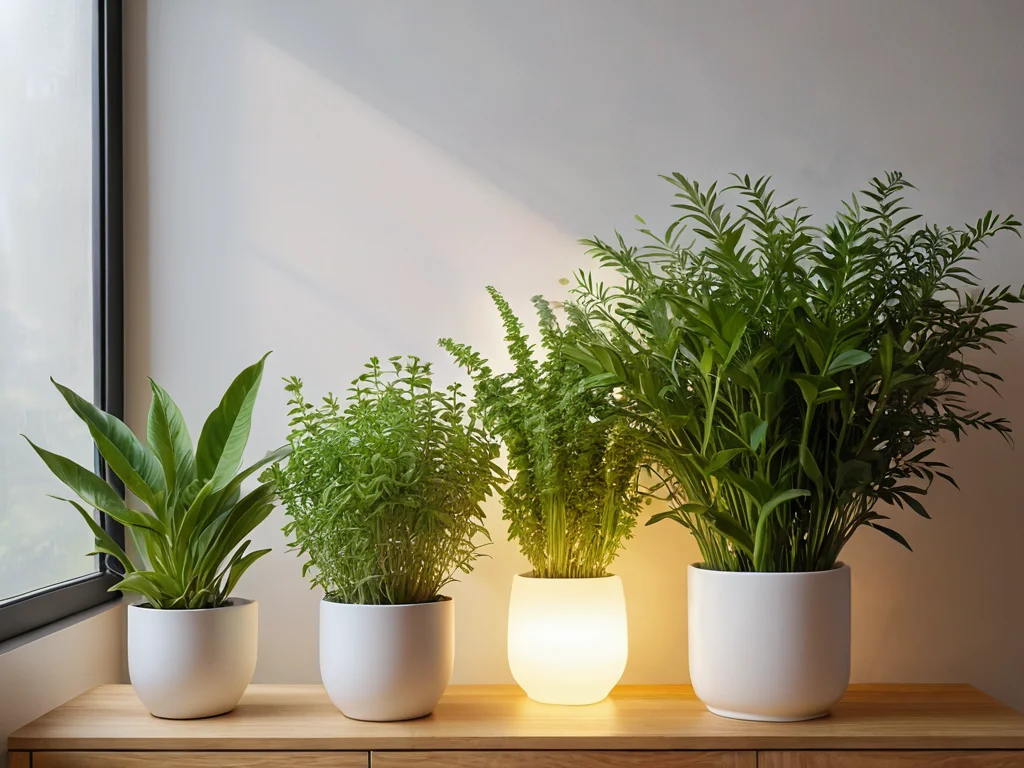
At the core of Feng Shui lies the concept of Qi – the universal life energy that permeates all existence and influences our well-being. The quality and flow of Qi in a home are directly linked to our health, luck, and harmony in relationships. Living plants play a key role in this process, acting as powerful conductors and transformers of energy.
It is believed that plants, especially those that actively grow and develop, generate positive Qi. They are living beings capable of absorbing negative vibrations and transforming them into beneficial energy. Like the lungs of the planet, they purify the air, but from a Feng Shui perspective, they also purify the energetic space. Their vitality, their ability to grow and renew, symbolizes abundance, development, and constant forward movement.
Herbs on the windowsill, due to their small size and high concentration of life energy in each leaf, are a kind of “accumulator” and “transmitter” of Qi. They attract sunlight, the energy of the earth and water, processing it into pure, living energy that then spreads throughout the room. When you care for herbs, you are not just watering and pruning them; you are interacting with this living energy, amplifying it and directing it in the desired direction.
The windowsill, situated between the external and internal environment, is an ideal location for such plants. It serves as a kind of “bridge,” allowing herbs to receive energy from the outside (sunlight, air) and distribute it inside the home. If the windowsill is clean, well-lit, and healthy, strong herbs are growing on it, it becomes a powerful portal for attracting auspicious Qi.
Even the aroma of herbs plays an important role. The essential oils released by plants affect our sense of smell and, consequently, our emotional state. From a Feng Shui perspective, pleasant, natural aromas promote the free flow of Qi, while sharp or unpleasant odors can create energetic blockages. Therefore, choosing aromatic herbs offers a double benefit: for both health and the home’s energy.
Thus, your herb corner on the windowsill is not just a collection of pots with greenery. It is an active Feng Shui element, a living system that constantly works for the benefit of your home and family, purifying, harmonizing, and energizing the space with positive energy. Understanding this, you can treat your green pets not only as a source of fresh ingredients but also as faithful helpers in creating a happy and prosperous life.
Choosing the “Right” Herbs: A Union of Benefit and Feng Shui Compatibility
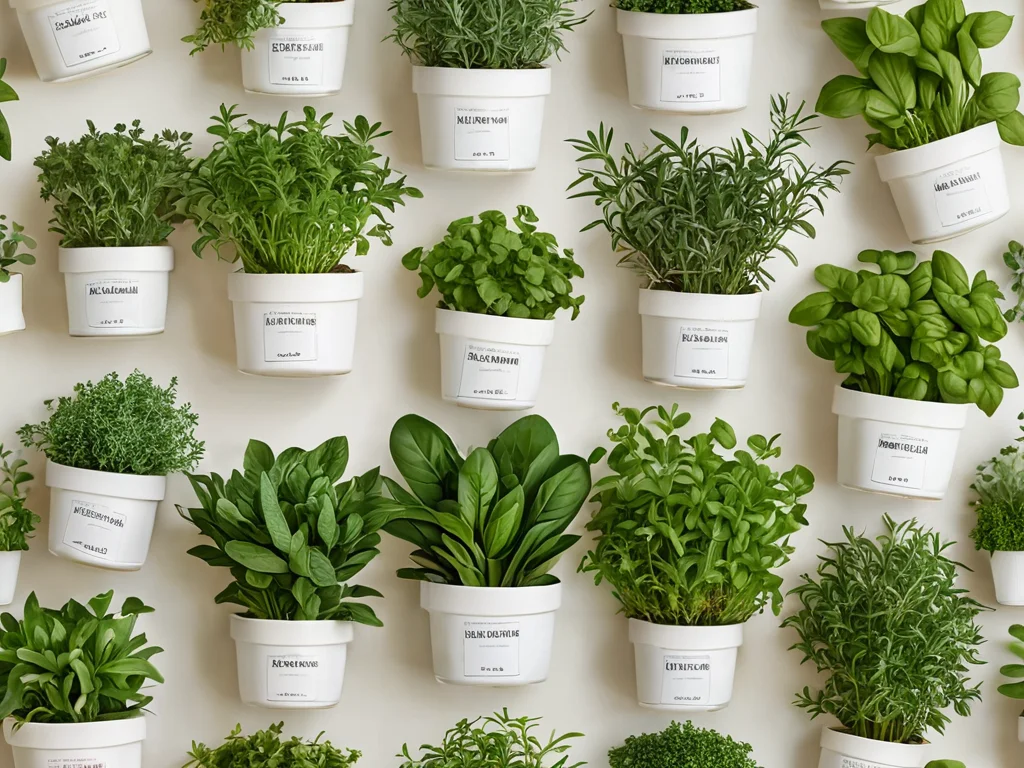
Choosing herbs for your windowsill is an engaging process that combines not only practical benefits for cooking and health but also a deep Feng Shui approach. It is important to choose plants that will not only grow well indoors but also possess favorable energy that supports your goals. Below is a list of herbs that are particularly valued in Feng Shui for their positive influence.
- Mint. This plant is associated with freshness, purity, and renewal. In Feng Shui, mint is believed to purify space from negative energy and attract wealth. Its invigorating aroma helps improve concentration and relieve stress. It is thought that placing mint in the wealth sector (southeast) can contribute to financial inflow, albeit not very actively, but rather by creating a favorable atmosphere for its attraction. Mint also helps with headaches and digestive problems, making it a versatile home helper.
- Basil. This aromatic king among herbs is a powerful protector in Feng Shui. It can repel negative vibrations and ill intentions. Basil is also associated with attracting love, happiness, and well-being into the home. Its bright green color and strong aroma create a sense of vitality. In the relationship sector (southwest), basil can strengthen family ties, and in the health sector (east), it can promote physical healing.
- Rosemary. Rosemary is believed to have strong purifying and protective properties. Its presence in the home helps improve memory and concentration, as well as banish depressive thoughts. In Feng Shui, rosemary is often used to create an atmosphere of mental clarity and protection from “energy vampires.” Placed in the career sector (north) or knowledge sector (northeast), it can promote success in learning and professional activities.
- Lavender. This beautiful herb is known for its calming properties. In Feng Shui, lavender helps create an atmosphere of peace, tranquility, and harmony. Its aroma promotes relaxation, improves sleep, and relieves anxiety. Placed in the bedroom or a relaxation area, lavender can harmonize energies and promote deep relaxation. It is also associated with love and romance, making it an excellent choice for the southwest sector.
- Thyme. Thyme in Feng Shui symbolizes courage, strength, and purification. It is believed to help overcome fears and attract positive energy that protects the home from illness. Its presence strengthens feelings of security and peace. Using thyme in cooking also contributes to strengthening health and vitality.
- Parsley and Dill. These popular herbs, while not possessing as strong “magical” properties as mint or basil, are still valued in Feng Shui for their connection to health and vitality. Their lush, green growth symbolizes prosperity and abundance. They bring freshness and growth energy into the home, especially if placed in the health sector (east). Their regular consumption, grown on your own windowsill, enhances this connection to well-being.
- Sage. Often used in space purification rituals, sage in Feng Shui is associated with wisdom, longevity, and the expulsion of negative energy. Its strong, penetrating aroma can cleanse the aura of the home and mind. Placing sage in the home, especially near the entrance or in areas where stagnant energy is felt, helps maintain purity and clarity.
When choosing herbs, it is important not only their symbolic meaning but also your personal attitude towards them. Choose those that you like, whose aroma is pleasant, and which you will enjoy caring for. After all, your intention and the positive energy invested in their care are among the most powerful factors in Feng Shui. Always remember that a healthy, strong plant radiates much more positive Qi than a withered and neglected one.
The Ideal Place for Each Herb: The Feng Shui Map of Your Windowsill
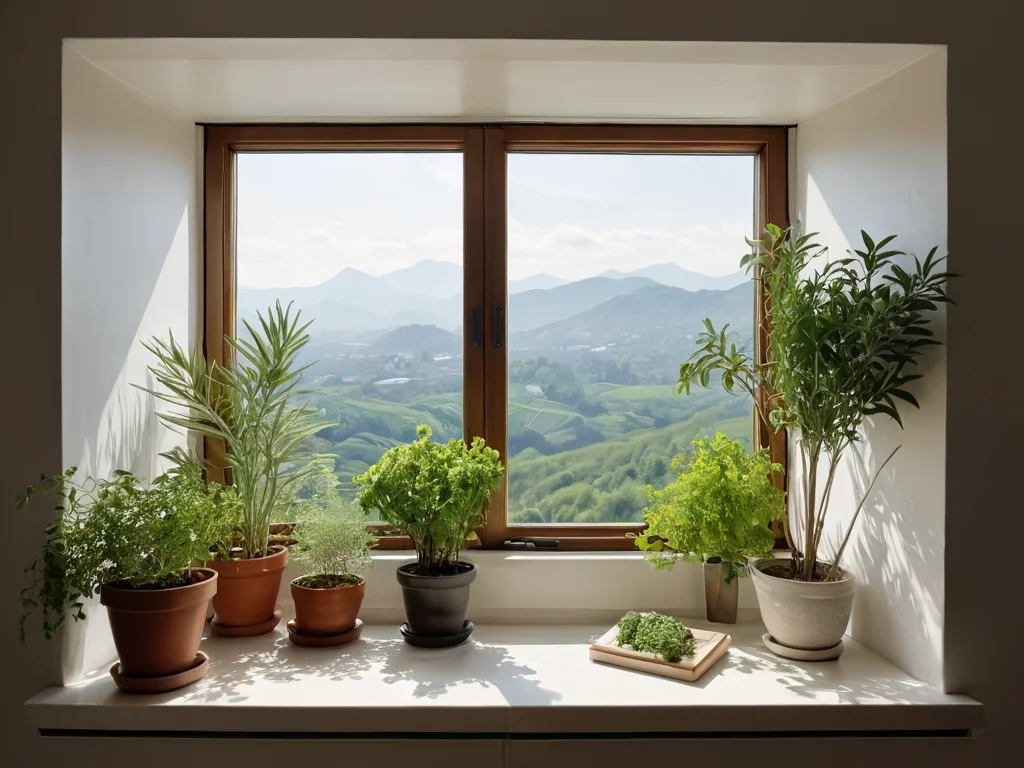
Placing herbs on the windowsill from a Feng Shui perspective is not a random process but a thoughtful strategy aimed at enhancing specific types of energy in your home. Using a simplified Bagua map, which can be superimposed on your windowsill, you can determine the best locations for each herb based on its energetic properties and your personal goals.
Imagine your windowsill as a miniature Bagua map. Orient it relative to the cardinal directions or relative to the room entrance if the windowsill is on one of the walls. Most often, it is oriented by cardinal directions, with the center as the reference point. Let’s consider the main directions and which herbs would be most appropriate there:
- North (Career Sector). This sector is associated with water and is related to professional growth, career, and life path. Herbs that promote mental clarity, concentration, and decisiveness will be appropriate here.
- Recommendation: Rosemary, Sage. Rosemary will help improve memory and focus on tasks, while sage will bring wisdom in decision-making.
- Northeast (Knowledge and Wisdom Sector). This is the Earth sector, responsible for learning, self-improvement, and spiritual development.
- Recommendation: Rosemary, Lavender. Rosemary supports mental activity, and lavender promotes relaxation and deep understanding, which is important for learning.
- East (Family and Health Sector). The Wood sector, associated with strong family ties, physical health, and new beginnings.
- Recommendation: Parsley, Dill, Basil, Thyme. All herbs associated with health and growth will be in their place here. Basil will strengthen family ties, and parsley and dill will bring vitality.
- Southeast (Wealth and Prosperity Sector). The Wood sector, associated with financial well-being and abundance.
- Recommendation: Mint, Basil. Mint, as mentioned, attracts wealth. Basil also promotes prosperity. It is important that the plants here are healthy and lush, symbolizing the growth of wealth.
- South (Fame and Reputation Sector). The Fire sector, responsible for your reputation, recognition, and public standing.
- Recommendation: Mint, Rosemary. Herbs that “refresh” and “purify” your image help strengthen your reputation. Mint brings clarity, rosemary – confidence.
- Southwest (Love and Relationships Sector). The Earth sector, associated with romantic and partnership relationships.
- Recommendation: Lavender, Basil. Lavender promotes harmony and love, basil – strengthens bonds. Choose plants with soft, rounded leaves, avoid sharp shapes.
- West (Children and Creativity Sector). The Metal sector, responsible for creative endeavors, projects, and children’s well-being.
- Recommendation: Mint, Thyme. Mint can inspire new ideas, thyme – give courage in their implementation.
- Northwest (Helpful People and Travel Sector). The Metal sector, associated with support, travel, and mentors.
- Recommendation: Rosemary, Sage. Rosemary will help think clearly when planning trips or seeking solutions, sage – will attract wise helpers.
- Center (Health and Harmony Sector). The center of the Bagua, associated with overall well-being and harmony in all aspects of life.
- Recommendation: Any healthy, lush herb that you particularly like. This could be the versatile basil or the cheerful parsley. The main thing is that the plant in the center embodies vitality.
In addition to orientation by Bagua, pay attention to the following general principles:
- Light. Most medicinal herbs love sunlight. Ensure your windowsill is sufficiently lit. Plants suffering from lack of light will emit weak Qi.
- Space. Do not overload the windowsill. Each plant should have enough space to grow and develop. Too close proximity can create stagnant energy.
- Cleanliness. The windowsill and pots should be clean. Dust and dirt block the flow of Qi.
- Balance. Strive for a balance of plant shapes and sizes. Avoid overly sharp or angular shapes that can create “sha” (unfavorable energy).
Remember that these recommendations are a guide. Your intuition and personal sense of harmony also play an important role. Observe your plants and how they affect your mood and the atmosphere in your home. This is a living process of interaction that will bring you much joy and benefit.
Caring for Herbs: How to Maintain Positive Energy and Growth
Caring for herbs is not just a set of agricultural techniques; from a Feng Shui perspective, it is daily interaction with living energy that directly affects the quality of Qi in your home. A healthy, thriving plant emits powerful, positive energy, while a wilting or sick one, on the contrary, can weaken the energetic field. Therefore, maintaining the vitality of your herbs is a key aspect of Feng Shui on the windowsill.
- Proper Watering: The Balance of Water (Yin and Yang).
- From a Feng Shui perspective: Water symbolizes wealth and abundance, as well as the flow of energy. Too much water can lead to root rot, symbolizing stagnation or even loss. Too little leads to wilting, signifying a weakening of life force. It is important to find a golden mean that will maintain optimal soil moisture. This symbolizes the balance of Yin and Yang, harmony in the home. Watering with mindfulness, with good thoughts about growth and prosperity, enhances this effect.
- Practical tip: Water herbs when the top layer of soil is dry to a depth of 1-2 cm. Use settled water at room temperature.
- Sufficient Lighting: Food for Qi.
- From a Feng Shui perspective: Sunlight is a source of Yang life energy, which nourishes and activates Qi. Plants deprived of light cannot fully produce and emit positive energy. Dim lighting creates an atmosphere of despondency and stagnation.
- Practical tip: Most medicinal herbs need at least 4-6 hours of direct sunlight per day. If natural light is insufficient, use grow lights, especially in the autumn-winter period.
- Regular Pruning: Removing Stagnant Energy.
- From a Feng Shui perspective: Removing dry, yellow, or damaged leaves and branches is not just a cosmetic procedure. It is a symbolic cleansing of stagnant, “dead” energy. Pruning stimulates new growth, which in turn activates the flow of fresh, young Qi. It’s like cleaning your house – you get rid of the unnecessary to make room for the new and better.
- Practical tip: Regularly inspect your herbs, remove anything that looks unhealthy. Pinch back the tops to encourage bushiness.
- Cleanliness of Leaves and Pots: Clarity and Free Flow.
- From a Feng Shui perspective: Dust on leaves not only hinders photosynthesis but also is a layer of stagnant energy. Dirty pots, streaks, soil residues – all create a sense of untidiness and block the free movement of Qi. Cleanliness is the key to clarity and free energy flow.
- Practical tip: Wipe leaves with a damp cloth, keep pots and the windowsill clean.
- Repotting and Fertilizing: Renewal and Nourishment.
- From a Feng Shui perspective: A plant that is cramped in its pot cannot develop fully, its roots “suffocate,” symbolizing limitations and the impossibility of growth in life. Fresh soil and nutrients give the plant new strength for growth, which is reflected in your ability to develop and prosper.
- Practical tip: Repot herbs into slightly larger pots as they grow. Use quality soil and organic fertilizers according to the plants’ needs.
- Intention and Communication: The Energy of Your Love.
- From a Feng Shui perspective: Your thoughts and emotions are also energy. When you care for herbs with love, care, and positive intention, you invest your energy in them, enhancing their ability to attract well-being. Talking to plants, praising their growth – all this creates a strong energetic field around them.
- Practical tip: Every time you care for your herbs, do so with joy, imagining them filling your home with health and prosperity.
Remember that your green corner is a living organism that reacts to your attitude. By investing your care and attention in it, you create a powerful source of positive Qi that will actively work for the benefit of your home.
Common Mistakes: What Can Block Qi Flow on Your Windowsill
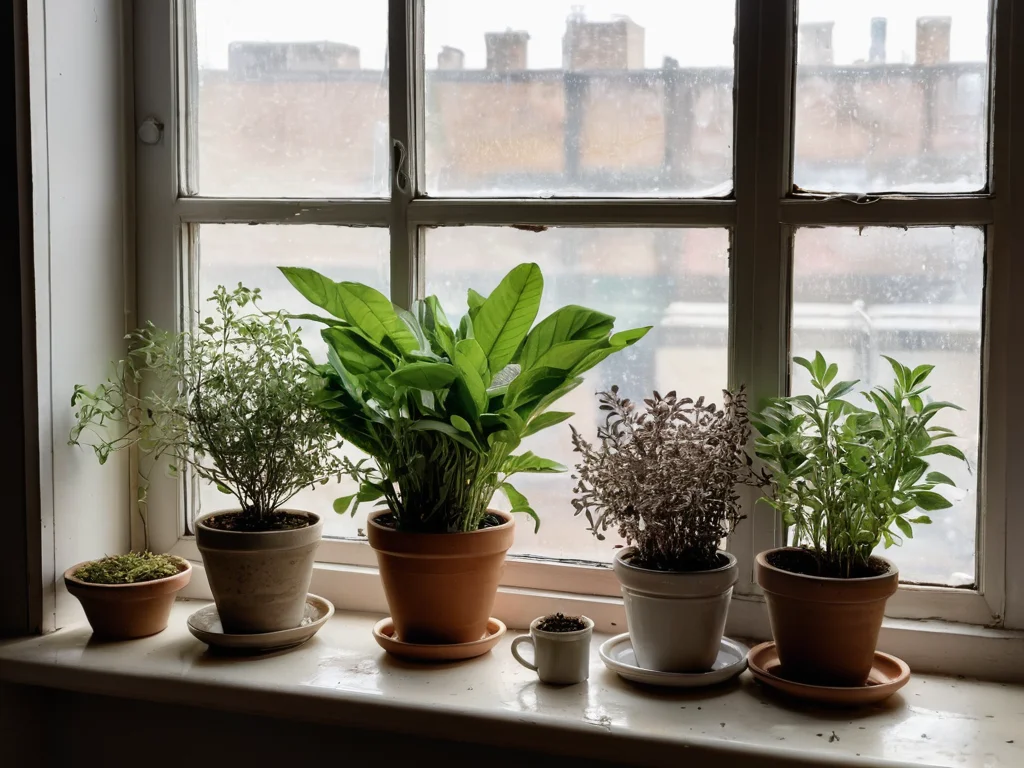
Even the most beneficial Feng Shui elements can become a source of problems if used incorrectly or if common mistakes are made. Your windowsill with herbs is no exception. To ensure the unimpeded flow of positive Qi and avoid undesirable energetic stagnation, it is important to know and avoid the following mistakes.
- Dry or Wilting Plants.
- Why it’s bad: In Feng Shui, dried, wilting, or sick plants are powerful sources of negative Sha Qi energy. They symbolize decline, stagnation, illness, and lack of vitality. Instead of attracting prosperity, they can deplete the energy of the home and its inhabitants. This is the most serious mistake one can make.
- What to do: Promptly remove all dried leaves, flowers, or branches. If a plant is sick and cannot be treated, it is better to replace it. Do not keep “dead” or dying plants in your home, no matter how valuable they may be.
- Overcrowded Windowsill.
- Why it’s bad: Too many pots, their disorderly arrangement, a pile of items unrelated to plants (old magazines, receipts, unnecessary souvenirs) create clutter and energetic chaos. Clutter blocks the free flow of Qi, preventing energy from renewing and circulating.
- What to do: Ensure sufficient space between pots. The windowsill should look neat and airy. Regularly remove all unnecessary items, leaving only what is related to plant care or harmonizes the space.
- Dirty Windows and Pots.
- Why it’s bad: Windows are the “eyes” of the house, through which external Qi enters. Dirty windows hinder the inflow of fresh energy and distort it. Dusty pots and leaves also do not contribute to a clean energy flow, creating an impression of neglect and decline.
- What to do: Regularly wash windows, especially in the area of the herb corner. Wipe pots and plant leaves, keep them perfectly clean.
- Using Artificial Plants or Dried Flowers Among Live Ones.
- Why it’s bad: Artificial flowers and dried flowers do not possess living Qi energy. Moreover, dried flowers can symbolize death and stagnation. Their proximity to live herbs can weaken the overall positive energy of the corner, creating dissonance.
- What to do: For Feng Shui activation on the windowsill, use only live, healthy plants. If you like dried flowers, place them in another part of the house where they will not conflict with living energy.
- Incorrect Pot Selection.
- Why it’s bad: Pots with sharp corners, aggressive patterns, or made of poor-quality materials can create negative energy. Cracks and chips on pots are also a source of Sha Qi.
- What to do: Choose pots made of natural materials (ceramic, terracotta), preferably of round or smooth shape. Prefer neutral or harmonious colors corresponding to the sector’s elements (e.g., brown or green for the east, red for the south). Replace damaged pots in a timely manner.
- Plants with Thorns or Sharp Leaves.
- Why it’s bad: From a Feng Shui perspective, plants with sharp thorns or overly aggressive leaves (e.g., cacti, which, although popular, are not always appropriate) can create “prickly” Sha Qi directed at the inhabitants of the house. They can cause tension, conflict, and aggression, especially if placed opposite the entrance, bed, or workspace.
- What to do: For the herb corner, choose plants with soft, rounded leaves. If you really love cacti, place them away from living areas, for example, on a hallway window, so they act as a barrier to external negative energy but do not direct their “prickliness” at you.
By avoiding these common mistakes, you will provide your herbs with ideal growing conditions and maximize their potential for attracting positive energy into your home.
Enhancing the Effect: Additional Feng Shui Elements for Your Herb Corner
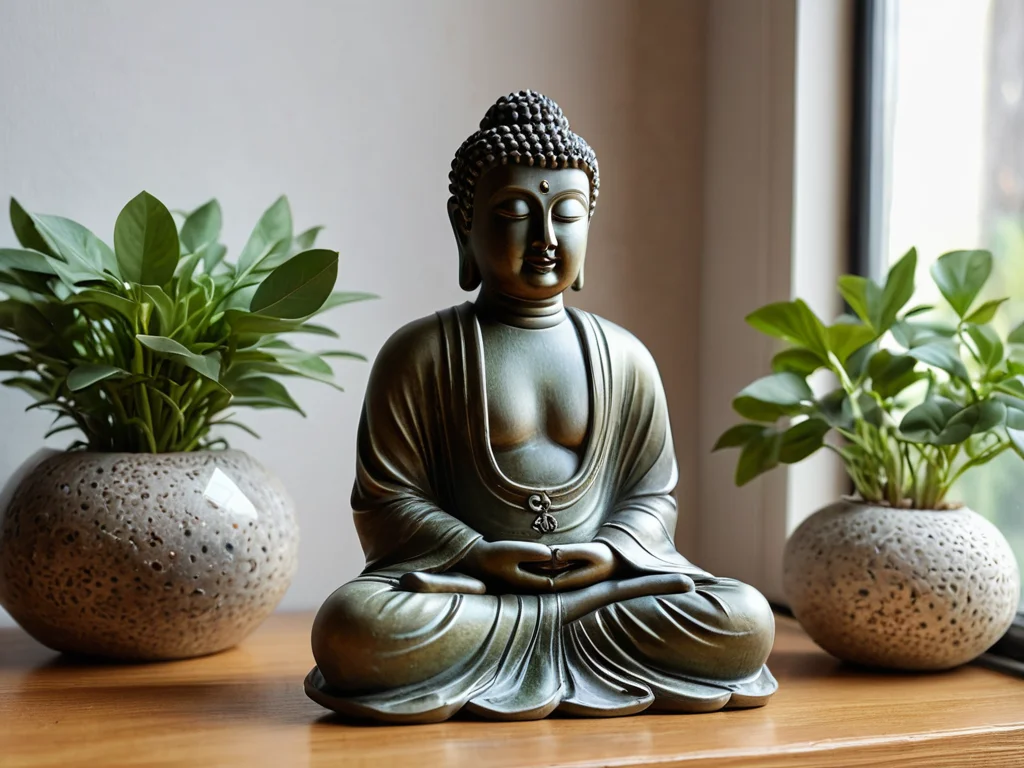
Your herb corner on the windowsill is already a source of beneficial energy in itself. However, by applying additional Feng Shui elements, you can significantly enhance this effect, creating a powerful harmonious zone that will work for the benefit of all aspects of your life. These elements, correctly chosen and placed, can act as catalysts for Qi, making your green oasis even more effective.
- Crystals.
- How they work: Crystals are known for their ability to store, transform, and emit energy. Placed near herbs, they can amplify their energetic field and direct Qi in the right direction.
- Recommendations:
- Rock Crystal: A universal energy amplifier, promotes clarity of thought and purification. Place a small crystal near the herbs for overall enhancement of their properties.
- Amethyst: For calmness, meditation, and spiritual growth. Ideal for herbs that promote relaxation (e.g., lavender) or are located in the knowledge sector.
- Jade: A symbol of health, longevity, and prosperity. Appropriate in the health or wealth sector, near herbs that also attract these benefits.
- Rose Quartz: For love and harmony in relationships. Place it near basil or lavender in the relationship sector.
- Small Water Features.
- How they work: Water in Feng Shui symbolizes wealth, abundance, and the constant movement of Qi. A small fountain or even just a bowl of clean water near the herbs can activate the wealth sector and ensure a smooth flow of energy.
- Recommendations: If space allows, a small tabletop fountain creating a gentle murmur would be ideal. If not, a regularly filled beautiful ceramic bowl with clean water, perhaps with floating candles or flowers, will also be very effective. Ensure the water is always clean and fresh.
- Color Palette of Pots and Decor.
- How they work: Colors in Feng Shui are associated with specific elements and energies. Properly chosen colors for pots, stands, or small decorative elements can enhance the energy of the sector where the herbs are located.
- Recommendations:
- Green, Brown: For the East (health, family) and Southeast (wealth). Support the Wood element.
- Blue, Black: For the North (career). Support the Water element.
- Red, Orange: For the South (fame). Support the Fire element. Use moderately.
- Yellow, Beige: For the Southwest (love, relationships) and Northeast (knowledge), as well as the Center. Support the Earth element.
- White, Gray, Metallic: For the West (children, creativity) and Northwest (helpful people). Support the Metal element.
- Aromatic Candles or Diffusers.
- How they work: In addition to the natural aromas of herbs, additional scents can enhance the desired mood. However, it is important to use natural aromas, without chemical additives.
- Recommendations: Use candles with essential oils (lavender for relaxation, citrus for energy) or diffusers with natural aromatic oils. Avoid overly strong or synthetic scents that can block natural Qi.
- Sound Elements.
- How they work: Light, melodious sounds, such as wind chimes, can stimulate the movement of Qi and purify the space.
- Recommendations: If the windowsill is positioned so that a small, not too loud wind chime can be placed on it, it can be beneficial. Choose chimes with a soft, pleasant sound.
- Intentions and Affirmations.
- How they work: The most powerful Feng Shui tool is your thought and intention. When you consciously direct your energy towards the desired outcome, you activate and enhance all the elements in your herb corner.
- Recommendations: Regularly conduct “intention ceremonies”: while watering or caring for your herbs, visualize the desired outcome – be it health, prosperity, or harmony. Speak positive affirmations, connecting them to the growth of your herbs.
By combining these elements with your healthy herbs, you will create not just a beautiful corner, but a true energy station that will continuously work for your benefit, filling your home with light, health, and prosperity.
Your Green Oasis: How to Start Applying Herb Feng Shui Today

So, we have journeyed from understanding Qi energy to practical advice on choosing and placing herbs, as well as caring for them and enhancing their effect. Now is the time to apply this knowledge in practice and create your own green oasis, which will become a source of harmony and well-being in your home.
The most important thing in Feng Shui is to start. You don’t have to rearrange the entire house or buy expensive decorative items right away. Start small, with one windowsill, and you will see how the atmosphere and your well-being gradually change. Here are a few simple steps to get started right now:
- Assess your windowsill. Clear it of all excess. Wipe away dust, wash the window. Imagine it as a blank canvas, ready to be filled with new, fresh energy.
- Choose your first herb. Start with one or two herbs that you intuitively like and whose properties match your current needs. Perhaps it will be basil for protection and well-being, or mint for freshness and a slight inflow of wealth.
- Select a suitable pot. Prefer natural materials and harmonious colors, avoid sharp corners. Ensure the pot has drainage holes.
- Plant or buy healthy seedlings. Choose strong, green plants without signs of illness. Healthy Qi begins with a healthy plant.
- Place according to Feng Shui. Using the Bagua map or general principles as a guide, find the best spot for your herb on the windowsill. Remember sufficient lighting.
- Care with love and attention. Regular watering, pruning, maintaining cleanliness are not just duties but a ritual of interaction with living energy. Invest your positive intentions in it.
- Add enhancing elements (optional). Over time, you can add a crystal, a small bowl of water, or use pots of specific colors to enhance the effect.
Remember that Feng Shui is the art of living in harmony with the surrounding world. Your herbs on the windowsill will become not just a source of fresh spices but also living talismans that will daily remind you of the importance of balance, growth, and renewal. They will purify your home, fill it with fresh Qi, and attract the blessings you dream of.
Discover this simple yet profound practice. Start today, and let the healing power of herbs and the wisdom of Feng Shui transform your home and your life. May your windowsill become your personal green oasis – a place of power, tranquility, and abundance.
